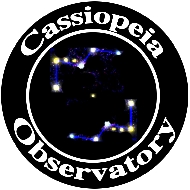Moon;
SkyTracker Pro Double Cluster, M31 & M33 Galaxies
Posted: 3 October 2019
|
Open: Wednesday, 2 October 2019, 1819 MST Temperature: 90°F |
Session: 1389 Conditions: Clear |
Equipment Used:
12" f/8 LX600 w/StarLock
2" 24mm UWA eyepiece
2" 24-8mm zoom eyepiece
SkyTracker Pro
Camera:
D850 DSLR
1826 MST: LX600 ON, StarLock OFF, High Precision OFF.
1829 MST: viewed Venus behind a tree, Mercury very low, Moon, Jupiter and four moons, and Saturn, 102X. Only two moons of Saturn were visible due to the still bright twilight sky.
1855 MST: mounted the D850 DSLR at prime focus. Took this photo of the Moon (1/320sec, ISO 400):

1903 MST: did some lunar observing with the Baader Zoom 8-24mm Eyepiece. The views were good, even at 203X (12mm) and 305X (8mm). Then viewed Jupiter and Saturn with the zoom eyepiece. Four moons were now visible at Saturn. The views were nice at all magnifications.
1940 MST: viewed M31 (Andromeda Galaxy), 102X.
I then set up the iOptron SkyTracker Pro (STP) on the observatory patio. Mounted the D850 DSLR with a Nikon 70-300mm lens, Vello ShutterBoss, and ScopeStuff Red Dot Finder. Polar aligned the SkyTracker Pro.

2018 MST: returned to the 12" telescope in the observatory and did some extended observing of M33 (Triangulum Galaxy), 102X. A lot of structure was visible even with the Moon still in the sky.
2034 MST: did some sky viewing using the Vortex 12x50 binoculars. Viewed the Andromeda Galaxy, Triangulum Galaxy, the Double Cluster (open star clusters), and Caroline's Rose (NGC7789, open star cluster). All were good views.
2055 MST: as the Moon was about to set I began preparing for sky imaging with the D850 on the STP. The first target was the Double Cluster. Using the Red Dot Finder on the DSLR made pointing the camera easy. This is a tracked, f/5.6, 30 seconds, ISO 3200, White Balance 4550K, Focal Length 300mm, image (slightly cropped) of the Double Cluster:

I then pointed the camera mid-way between the Andromeda (M31) and Triangulum (M33) galaxies. Again, using the Red Dot Finder made this easy. This is a tracked, f/4.5, 30 seconds, ISO 3200, White Balance 4550K, Focal Length 70mm, image:

Mouseover or tap on image for labels
NGC752 (open star cluster) is also visible at the lower right.
This is a tracked, f/5.6, 3 minutes, ISO 6400, White Balance 4550K, Focal Length 300mm, image (cropped vertically):

Click or tap on image for larger version
2134 MST: ended imaging.
2136 MST: LX600 OFF.
|
Close: Wednesday, 2 October 2019, 2144 MST Temperature: 65°F |
Session Length: 3h 25m Conditions: Clear |
Comments are welcome using Email. Twitter users can use the button below to tweet this report to their followers. Thanks.
Cassiopeia Observatory Home Page
Copyright ©2019 Michael L. Weasner / mweasner@me.com
URL = http://www.weasner.com/co/Reports/2019/10/03/index.html
